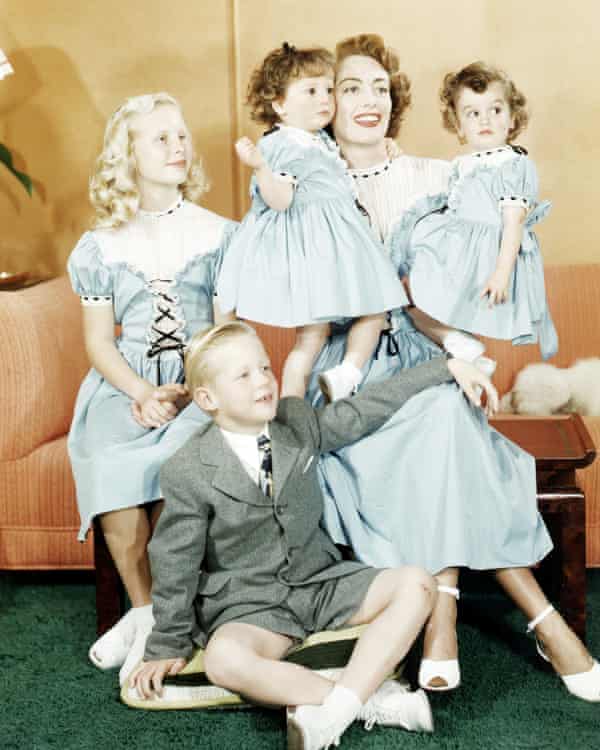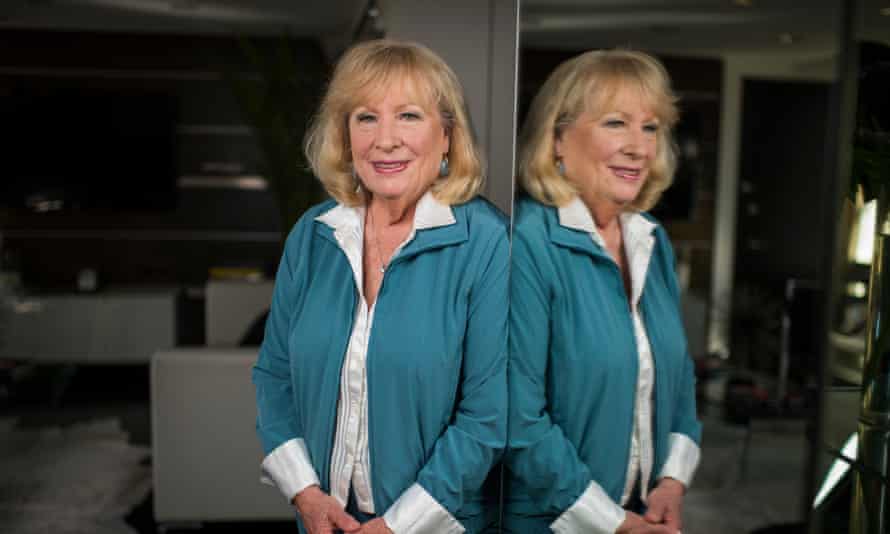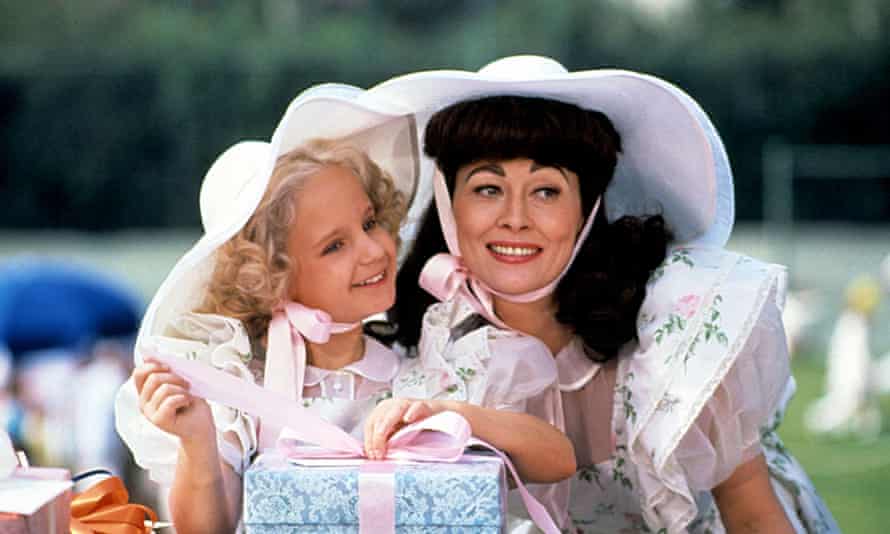How Much Money Did Christina Crawford Make On Mommie Dearest?
I t is Christina Crawford's 80th birthday on the 24-hour interval we meet, and she is tireless after an opening night. A couple of days earlier, Mommie Dearest, the philharmonic supported her smash hit 1978 memoir of the unvaried bring up, had a run-through at Birdland, the illustrious New York State roll in the hay venue, and she is hoping the show will find funding for a full production. "It was sold out, it was fabulous," she says, looking exciting and spry, before issuing what has become a standard warning: "The musical had absolutely nothing to do with the movie. I need to put up that in big capital letters."
The movie she is referring to is, of course, the 1981 adaptation of Christina's memoir that starred Faye Dunaway atomic number 3 Joan Crawford, Christina's adoptive mother, whose abuses, soberly detailed in the book, were turned by the movie into high camp. As chronicled in Mommie Dearest, Crawford slapped, kicked, punched and tried to strangle her daughter, while subjecting her to a severe schedule of cleansing and opposite home chores, driven by the movie wi's alcoholism and who knows what else. "We didn't have a spoken language for information technology," says Christina. "We didn't have laws for it. We didn't own a social context for IT, and we had shame. A tremendous amount of shame, coupled with fear. It wasn't abundant." She laughs at the understatement. The publication of Mommie Dearest, perhaps the first memoir of all time to document child misuse from the viewpoint of the child, changed the landscape of victim representation and was an early precursor to today's more robust state of victims' rights. "I'm not a martyr, but I intend, sounding plump for, it is truly amazing to me what one someone privy doh."
It was all a years ago. Crawford adopted Christina in 1940, and died of a heart attack in 1977. Christina's junior Brother, Christopher, died of cancer in 2006. Tarriance interest in the write up hinges along enduring enthrallment with the bewitch of that Hollywood ERA and on the particular contradictions of Crawford. In the linguistic context of #MeToo, the story has renewed rapport, and Christina is an interesting eccentric study in the long-wool-range effects of abuse every bit she tacks between cheerfully declaring herself free from the fallout of her childhood, and testifying to how calculative that dispossession has been.

She wrote the musical to formulate more fully her relationship with her brother, Christopher – "how the siblings grow up through the abuse to survive in the real world, with real minute going for them exclude their ain love of apiece strange and the will to live". Long before the terminus "gaslighting" became mainstream, they were vital as each other's witness; without Saint Christopher, Christina believes, she wouldn't have survived. At this many long time' remove, I'm curious as to whether the toxicity of the worldly continues to have whatsoever power over her.
"I don't bang that you ever master it," she says. "But you revive terms with it. I honestly don't think it controls me any more. It is something that you have to live through with, and IT's very difficult, because there's no roadmap for it, even today. Generally oral presentation, we don't recognise the long-condition scientific discipline impairment that is inflicted on people who are abused, neglected and trafficked. IT is hornlike for populate to understand that what happened 20 years ago is creating behaviour patterns today." At the show, a man session next to Christina introduced himself to her as the psychiatrist at Rikers Island, the notorious New York prison house – "coming to our indicate to learn close to post-unhealthiness stress disorder. I thought this was fantastic."
Christina's own survival of the fittest was something she achieved almost entirely without the supporte of outside agencies. In the US, child protection Torah were introduced from the 1960s, and the Child Abuse Prevention and Treatment Act, creating a single national focus for preventing and responding to child abuse and neglect, didn't come into gist until in 1974. Growing upbound in Movie industry in the 40s and early 50s, Christina had nary resort to the authorities. As a matter of fact, aft a particularly violent episode she characterises as her mother "trying to kill me", it was Crawford herself who called the police and asked them to arrest her girl for delinquency. "I was 13 or 14. And it was then that I realised the world had gone maniacal. The officer was very kind. He told ME that there was nothing helium could perform because there were no laws to protect me. Atomic number 2 told me: 'You have to try to live on [here] until you are 18 and backside break sovereign. But, otherwise, if anyone calls me once again happening you, you'll have to attend juvenile detainment.'"
These years, I propose, Crawford would have been granted a diagnosing. Christina looks fiercely indignant. "She would throw been in jail! She would've been hauled off to put away for attempted murder. What is the excuse for that? There's No alibi. It doesn't matter. IT doesn't matter. It doesn't matter. That's not the issue. And that's not my responsibility, in any event."
The laws changed, and children became healthier shielded. Christina started to get some distance on her puerility. After being sent, at the age of 10, to boarding civilize, she understood that the rules she grew up under weren't normal. She well-tried to make a grade of self-esteem after years of being told by her mother that she was useless. There was no more real therapeutic language at her disposal and no framework for recovery. "It was day away Clarence Shepard Day Jr.. I had some teachers, I had some coaches. I had instruction, which I adored. For me, pedagogy was always the path forward and that's what I used. It has to do with how a great deal you want to comprise good. Do you want to represent free? And some people fail; they just are not strengthened enough. A lot of them are dead. And a lot of them are in jail."

She was helped, rather perversely, by a fear of being incarcerated that grew out of her fuss's constant threats to have her put away. "I had a terror of being fastened up. How could I not? And my terror of being locked up I think kept me on the untwisted and narrow."
Reverence is the water that abused children swim in, Christina says. "Because you don't know what's going to happen and your life sentence is so dynamical system. But on the other side of the par, it's fear from masses who are afraid to verbalize up. Dread that they're going to lose their line of work OR that people are departure to say something bad about them. If you were to require me some cardinal affair that embraces all of us, IT's the faithful fear."
This was precisely her get. When she was a tike, housekeepers, secretaries, nannies and teachers were aware of what was happening, only no unmatchable who knew spoke upbound. After the book came call at 1978, stars of Crawford's vintage lined up to defend her, as did former members of her household. It was a generational closing of the ranks over what appeared, to Crawford's contemporaries, to be a piece of monstrous impertinence. Christina laughs very loudly at this. "Well, yes, I think it was! To say the least!"
Christina didn't originally intend to write a tell-all. In her early 20s, she worked as an actor in front enrolling on a stage course at UCLA and departure on to gain a master's at the University of Southern California. She would advanced work in corporate communications. After a period of estrangement in the latter years of her bring fort's liveliness, she unsuccessful a reconciliation. Did she think the rapprochement was real?
"I intellection it was," she says. "But IT clad not to have been. No, towards the end, she didn't have any put to work. She was an intoxicating. She was ill. She was do drugs-addicted. And I think she just wasn't playing with a full deck. And equally soon A I left New York to go back to California to work, I completely lost context – not contact, but context with her, because I wasn't physically present. Then she died."
In spite of the apparent rapprochement, Christina and Christopher were cut off of the will, for what Crawford cited as "reasons which are considerably known to them". Christina was so furious she went uninterrupted to her desk and started writing inoperative everything that had happened in her childhood.
The book sold more than a meg copies and suffered an enormous pushback from contemporaries of Crawford's. It was gaslighting, perfect and simple, but Christina wasn't surprised. "No, I understood Hollywood," she says with a laugh. "I knew where they were coming from – they were censurable of seeing and not saying. It was blaming the courier for the nonfunctional news program. Most of them are dead now; I have outlived all of them! And I never replied to some of them, or responded. I simply stuck to the message that I knew to be the truth."

Her two junior siblings disputed the book, too, not unusual in an abusive syndicate. "Opposite people in the family experience the parenting situation in diametric slipway. Because the parenting situation is several towards them, and that's a divide-and-seize type of situation."
Saint Christopher, in spite of his desire for privacy, remained wholly supportive, she says, and she accepted thousands of letters "from people all terminated the world World Health Organization had never heard somebody verbalise up on their behalf before. And that took me forward on a wave of faith."
The ripple effectuate is still being felt. "Look at Michigan State, with the gymnasts. Look at Ohio State, with the athletes. Look at Pen State [where the abusive football coach, Jerry Sandusky, was convicted of 45 counts of nestling sexual abuse]. This is right now." Even with hashtags exhorting populate to believe victims, the police force placid lags and there is a outsized caveat around home clapperclaw, about which people have a inclination to say "who knows what really happened", says Christina. If she could change one law of nature, it would be the statute of limitations. "When you have a written of limitations against sexual assault of children, then near of the perpetrators a-ok free because some states only have three years. Some have 10. Maybe some have 20. Only if it happens to children, so away the fourth dimension they get under one's skin gaga sufficient to mouth off out, operating theater to understand what happened to them, the codified of limitations has been reached. And that's all about protecting the culprit."
In 1981, Christina had a debilitating stroke, underwent a five-year long recuperation and, for the past 25 years, has lived in rural Idaho, writing a serial publication of follow-ups to Mommie Dearest. I hope her musical finds a angel. Information technology is a timely narration, and the focus happening her relationship with Christopher is very moving.
The fear doesn't go away when the abuser dies. "No," she says quietly. "Because it's internal." With time, and work, however, it lessens. Now, when Christina unexpectedly sees a photo of her mother, she has no reaction. "Nothing. No."
Is information technology indifference?
"No. It's just … sufferance." Rear end she still follow ambushed by responses arranged down in her childhood: the fight or flight, hardwired in her wi?
"No, I don't think so. Non any more." She smiles. "Information technology has been a long meter."
How Much Money Did Christina Crawford Make On Mommie Dearest?
Source: https://www.theguardian.com/society/2019/jun/25/christina-crawford-on-life-after-mommie-dearest-my-mother-should-have-been-in-jail
Posted by: dahmsthallusithe.blogspot.com

0 Response to "How Much Money Did Christina Crawford Make On Mommie Dearest?"
Post a Comment